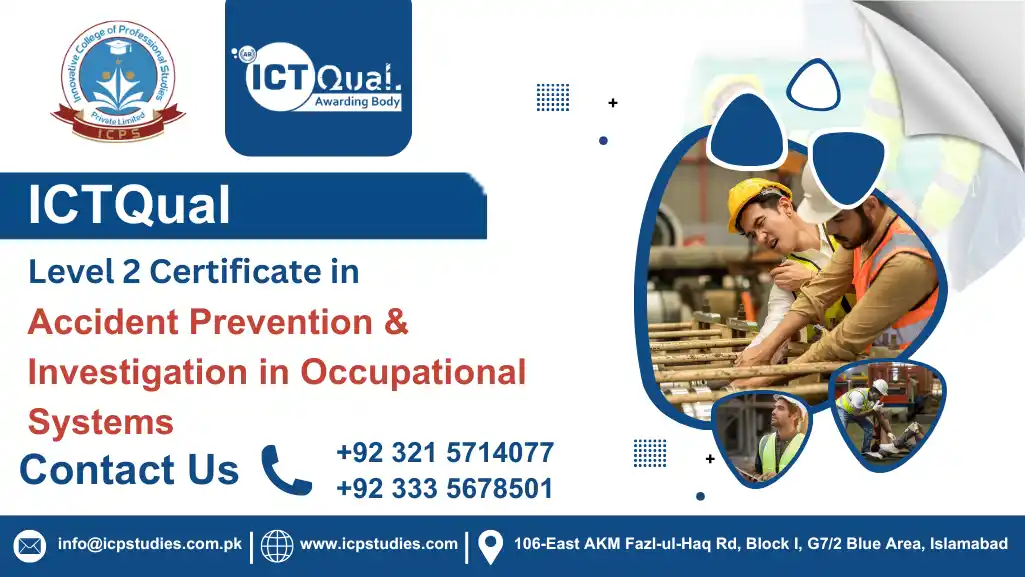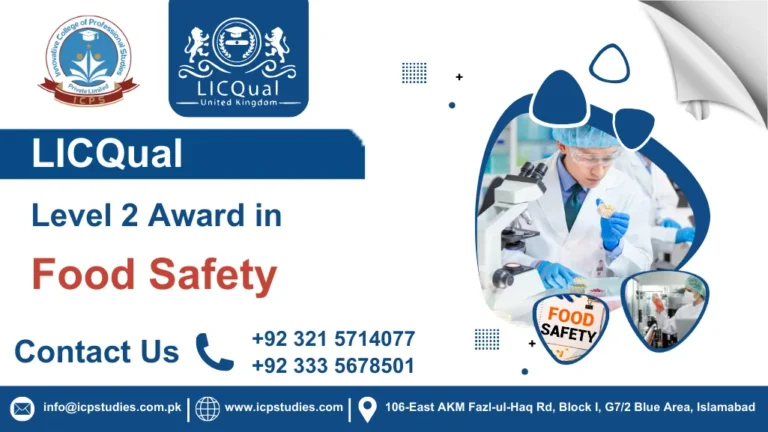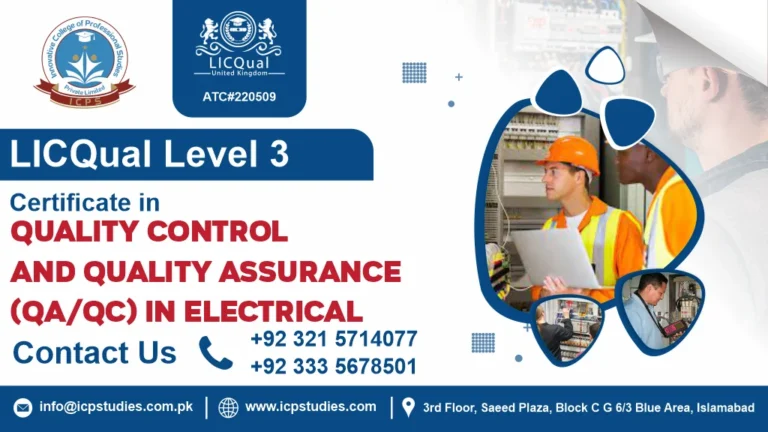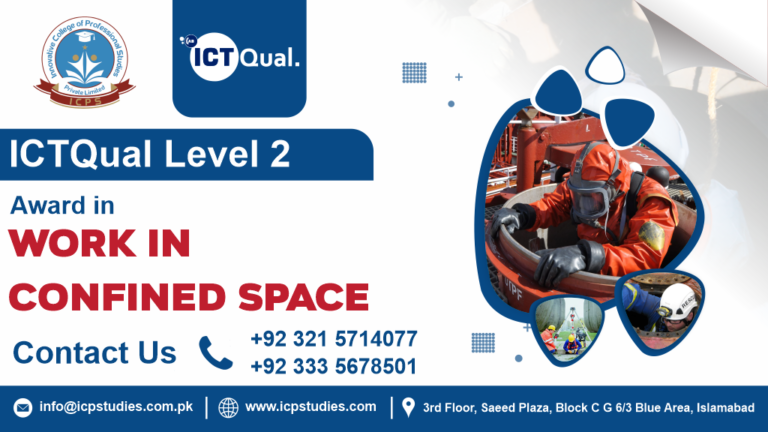Workplace safety is a fundamental priority in every industry, and organisations must ensure that proper systems are in place to manage risks and prevent accidents. The ICTQual Level 2 Certificate in Accident Prevention and Investigation in Occupational Systems provides essential knowledge and practical skills for individuals involved in occupational health and safety roles. This qualification equips learners with a foundational understanding of how to minimise incidents, respond effectively to workplace accidents, and support a culture of safety.
The ICTQual Level 2 Certificate is designed to meet the growing demand for competent professionals in workplace safety management. This course offers a structured approach to identifying hazards, implementing preventive measures, and conducting thorough accident investigations. Whether you are starting a career in health and safety or looking to enhance your current role, this qualification provides the core competencies needed to contribute meaningfully to occupational safety systems.
The ICTQual Level 2 Certificate in Accident Prevention and Investigation in Occupational Systems provides a strong foundation for individuals looking to build a career in workplace safety or improve their organisation’s health and safety performance. With practical insights, industry-aligned content, and recognised certification, this course empowers learners to take an active role in creating safer work environments.
All About ICTQual Level 2 Certificate in Accident Prevention and Investigation in Occupational Systems
Course Overview
The ICTQual Level 2 Certificate in Accident Prevention and Investigation in Occupational Systems is a foundational qualification designed to equip learners with the essential skills and knowledge to identify workplace hazards, prevent accidents, and conduct effective incident investigations. This course is ideal for individuals responsible for workplace safety, including supervisors, team leaders, and entry-level health and safety professionals across a wide range of industries.
Delivered through flexible learning methods, this Level 2 certificate supports career development in health and safety and serves as a pathway to higher-level qualifications. It ensures that participants are equipped not only to meet industry standards but also to promote a culture of continuous safety improvement within their organisations.
Whether you are seeking to enhance your professional skills or reduce workplace risks, the ICTQual Level 2 Certificate in Accident Prevention and Investigation is a valuable step toward achieving safer operational systems.
Study Units
- Introduction to Accident Prevention
- Risk Assessment and Hazard Identification
- Accident Investigation Techniques
- Legal and Regulatory Framework for Safety
- Implementing Corrective Actions and Safety Measures
- Developing Safety Policies and Procedures
To enrol in the ICTQual Level 2 Certificate in Accident Prevention and Investigation in Occupational Systems, applicants are expected to meet the following criteria:
Minimum Age
Learners must be at least 16 years of age at the time of enrolment.
Educational Background
There are no formal academic prerequisites; however, a basic understanding of workplace processes or prior training in health and safety can be beneficial.
Work Experience
While prior work experience in a relevant setting is not mandatory, it is advantageous. The course is particularly suitable for individuals currently employed in roles that involve responsibility for workplace safety or those aspiring to such positions.
Language Proficiency
As the course content is delivered in English, learners should have a good command of written and spoken English. For non-native English speakers, evidence of English language proficiency may be required to ensure successful course participation.
The ICTQual Level 2 Certificate in Accident Prevention and Investigation in Occupational Systems is suitable for individuals across a wide range of industries who are involved in workplace safety or looking to begin a career in this field. This course is particularly ideal for:
- Organisations aiming to upskill staff to improve safety culture and reduce workplace incidents
- Health and safety assistants or officers seeking formal certification
- Team leaders, supervisors, and line managers with safety responsibilities
- Employees tasked with incident reporting and basic risk assessment duties
- Individuals preparing for more advanced occupational health and safety qualifications
- New entrants to the health and safety profession looking for foundational training
- Workers in high-risk environments such as construction, manufacturing, logistics, and healthcare
Learning Outcomes
Introduction to Accident Prevention
- Understand the key principles of accident prevention in occupational environments
- Recognise the causes and types of accidents in the workplace
- Identify the importance of a proactive safety culture
- Learn basic strategies for reducing risks and preventing workplace incidents
Risk Assessment and Hazard Identification
- Develop the skills to identify workplace hazards and assess associated risks
- Apply risk assessment techniques to evaluate potential dangers in various work settings
- Understand the significance of controlling risks and minimising harm
- Learn how to prioritise hazards based on severity and likelihood of occurrence
Accident Investigation Techniques
- Gain knowledge of systematic methods for investigating workplace accidents
- Collect and analyse data related to incidents to identify root causes
- Learn how to prepare accident investigation reports and recommendations
- Understand how to implement corrective actions following an investigation
Legal and Regulatory Framework for Safety
- Understand the key health and safety legislation that governs workplace safety in the UK
- Recognise the responsibilities of employers and employees under health and safety laws
- Learn about relevant regulations, such as the Health and Safety at Work Act and other industry-specific guidelines
- Apply legal principles to ensure compliance with safety standards and reduce legal risks
Implementing Corrective Actions and Safety Measures
- Develop skills to create and implement corrective actions following safety incidents
- Learn how to monitor and evaluate the effectiveness of safety measures
- Understand how to adapt safety procedures based on ongoing risk assessments
- Promote continuous improvement in safety practices within the workplace
Developing Safety Policies and Procedures
- Understand the process of developing comprehensive safety policies for an organisation
- Learn how to create clear and effective procedures for handling safety issues
- Apply industry best practices to ensure safety policies meet legal and regulatory requirements
- Promote a consistent and unified approach to safety across all levels of the organisation
FAQs ICTQual Level 2 Certificate in Accident Prevention and Investigation in Occupational Systems







